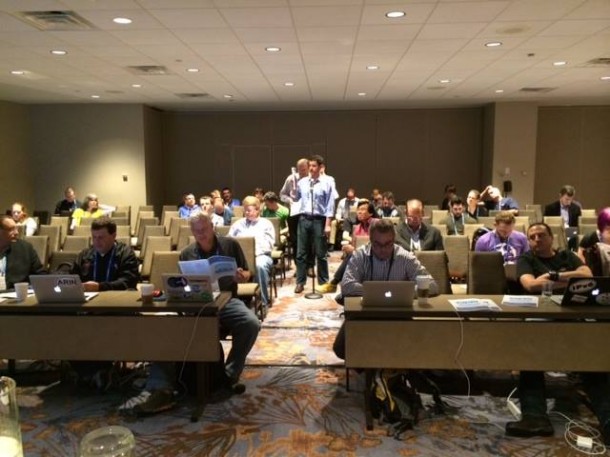
A Process of Refining Policies [Archived]
OUT OF DATE?
Here in the Vault, information is published in its final form and then not changed or updated. As a result, some content, specifically links to other pages and other references, may be out-of-date or no longer available.
By John Sweeting, Chair, ARIN Advisory Council
ARIN hosted a Public Policy Consultation (PPC) at NANOG 60 in Atlanta, Georgia on February 11. The report for this meeting, which includes presentations, summary notes, webcast archives and transcripts of the entire meeting, is available on the ARIN website. It includes the presentation and discussion of one recommended draft policy, eight draft policies, and three proposals.
The Atlanta PPC was a good example of the how the ARIN policy process works; it is a process of refinement. Proposals and draft policies go through multiple reviews and revisions before being accepted as Policy and added to the Number Resource Policy Manual (NRPM) or abandoned along the way. The PPC is one tool, along with the Public Policy Mailing List (PPML) and ARIN Public Policy Meetings (PPM), that allows the AC to interact with the community. This particular PPC demonstrated areas where current draft policies required additional review and editing.

Highlights from the Discussion
We had some active discussions regarding a few of the policies. I’d like to highlight a some of those discussions so you can get a sense for how the process works.
Recommended Draft Policy ARIN-2013-8: Subsequent Allocations for New Multiple Discrete Networks would add definitive criteria to indicate what the requirements are for getting additional space under the multiple discrete networks policy.
One community member pointed out that requiring someone to have connectivity prior to getting address space was not conducive to good business practices. A question raised was - if someone needs to get connectivity before they get address space, what happens if they can’t get space after they get connectivity? The discussion centered on finding language that would work to ensure the business that required address space was not left in a position of paying for services that they could not get addresses for. Follow on discussion has been taking place on the PPML.
Draft Policy ARIN-2014-1: Out of Region Use would clearly define and permit out of region use of address space issued by ARIN. It would require that such out of region use be verified the same way that in-region use is verified and would specifically authorize ARIN to contract with out of region providers if necessary to verify that use.
It was pointed out this is not intended to change criteria for requesting space, nor does it impact new requests, only how existing space usage is measured. Others noted if this policy passes, it would speed up depletion of IPv4 at ARIN, and increase the need for inter‑RIR coordination effort. Concern was also expressed that this could open up the door to position ARIN as a global RIR although that is definitely not the intent.
Draft Policy ARIN-2014-7: Section 4.4 Micro Allocation Conservation Update would raise the required number of operators that must get together to justify an allocation from ARIN for an IXP from two to three.
During the discussion it was brought up there are not a lot of IXPs in the ARIN regions, so this policy is to encourage conservation and help develop more successful IXPs in the region. There was also language regarding how to apply fees. Some voiced dissent that this oversteps the scope of the NRPM, and that the Board should only be defining the status of organizations with regard to establishing their billing category (ISP, End-user, etc.)
To get a sense for all the conversations that occurred during the policy discussions, check out the full report for the PPC at NANOG 60. The Atlanta PPC was a great example of how these consultations help gather feedback from the community to hone policy language and positions. This will help us to use our time more efficiently at ARIN’s next public policy meeting in Chicago this spring as well as help the ARIN Advisory Council present good policy to the community.
What’s Next?
Whether or not you had the chance to join us remotely or in person for this most recent PPC, I think you will find it worth your time to participate in ARIN 33, 13 – 16 April in Chicago, Illinois where we will revisit many of these proposals and possibly consider a few new ones as well. In the meantime please share your thoughts and interests in any of these policies with the community on PPML.
OUT OF DATE?
Here in the Vault, information is published in its final form and then not changed or updated. As a result, some content, specifically links to other pages and other references, may be out-of-date or no longer available.
